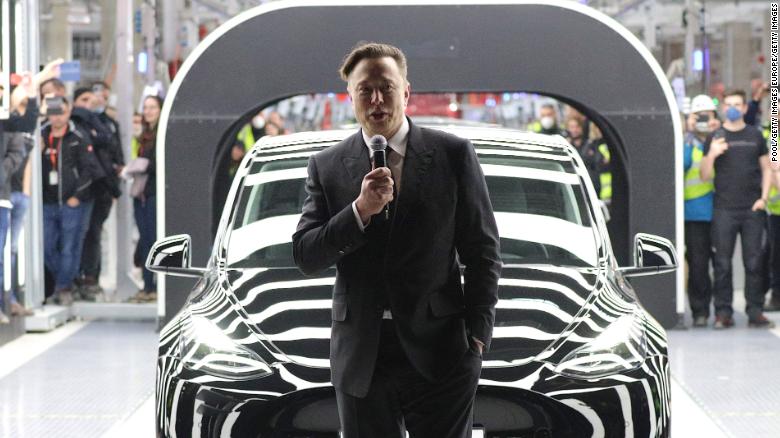New York (CNN Business) – Elon Musk has spent weeks raising warnings that Twitter could have more fake, spam and bot accounts than previously revealed and threatening to break his $ 44 billion deal to buy a company if it does not provide additional information. to examine the matter.
Now, Twitter is apparently planning to provide Musk with “firehose” data about tweets on the platform, according to recent reports from the Washington Post and the New York Times. The Twitter firehose is a real-time broadcast of millions of social tweets that are sent to the forum daily and information on the accounts behind it, although it may not contain confidential information such as the web address to which the tweet was sent.
Twitter may have been backed up after Musk’s lawyer argued that he was denied information he was entitled to in the agreement. But in granting access to the data firehose, Twitter (TWTR) puts it at risk of trying to fix one problem – Musk’s questionable threats to discontinue bot access, some analysts believe it is just an excuse to leave the deal now feel he has too much value – while possibly creating news new.

The seemingly unpopular nature of such data sharing with Musk – a non-corporate, non-researcher and not one of the few companies that pay to access information – can create a lot of anonymity. , from competing risks to privacy issues, some viewers of the industry comment. And that is no longer the case with Musk’s history of aggressive behavior and sometimes misunderstood online and offline.
“Musk in the past, we have seen that he is an iconoclast, who likes to express complaints freely, on social media,” said Inga Trauthig, senior researcher at the Center for Media Engagement at the University of Texas in Austin. Some companies have access to this data, he notes, but “they actually have more detailed NDA contracts. ‘Will Musk be the same?’ The first part of the question, and the second will be, ‘will you stick to them?’ ”
In a letter asking for more information on Twitter, Musk’s lawyer said the millionaire would ensure that “anyone who reviews information is bound by a non-disclosure agreement” and will not “keep or use any sensitive information competitively if the transaction is not completed.” However, Musk wrote on Twitter last month that the team Twitter law firm contacted him to “complain about me breaking their NDA” and other comments about the bots.
Musk did not immediately respond to a request for comment. A Twitter spokesman declined to comment on a report that the company would share firehose with Musk but pointed out an earlier statement that the company owned and would continue to share information with Musk in accordance with the acquisition agreement.
As well as the uncertainty over how Musk will use the data directly, there are questions about whether, if any, Musk will be able to extract data the company itself cannot. Twitter regularly releases its own number of bots on the platform, and said such accounts account for less than 5% of daily active users making money. Among its peers on social media, Twitter has historically been more outspoken about bot activity in its area by making public disclosure, among other measures, according to Trauthig.
The fact that he is now abruptly fixed on bots as a matter “may not have Musk at all known how social media works in general, and Twitter in particular, or that this is some kind of political direction,” he said.
Musk said at a Miami tech conference last month that he believes bots and fake users make up at least 20% of the Twitter user base, and possibly up to 90%. While some experts think that the presence of bots may be slightly higher than company estimates, many believe the value is not as high as Musk suggested.
The exact number of robots appears “very far from the point” when Musk’s claim is that “because of his business acumen and technical knowledge, he can make this company profitable and very useful,” said Ryan Calo, a law professor at the University of Washington. School of Law and the founding director of UW Tech Policy Lab.
Moreover, there is no clear definition of what a bot or spam or a fake account is, and not all of them are a problem – although Musk, who is known to have multiple spam accounts following him, has drawn them broadly as a scourge. “I think trust is very important and because of the usefulness of the system, clearing troll farms and bots and spam is very important,” he told Twitter staff at a company hall event Thursday.
Often, bots are regarded as accounts that use automated computer programs, in whole or in part, to send and communicate with other users, according to Kaicheng Yang, who surveys real players on social media platforms at the Indiana University Observatory on Social Media. Some automated accounts are harmless, such as news update accounts or Big Ben account tweeting “BONG” hourly, hourly. And some accounts are owned by people who appear to be deliberately mimicking computer behavior in order to deceive other users.
“We don’t even have a clear definition of what we’re talking about,” said Yang, who developed a tool called Botometer that monitors Twitter-like bot activity. He added that automation itself is not bad, “it is a feature Twitter offers and helps in many situations, and sometimes just for fun.”
Twitter CEO Parag Agrawal spoke of those natural challenges in counting bots during a retreat with Musk on Twitter last month. “Spam is not just ‘binary’ (person / not person),” Agrawal tweeted. “The most advanced spam campaigns use a combination of integrated people + automation … complex and difficult to master.” (Musk responded to Agrawal’s tweet with a poop emoji.)